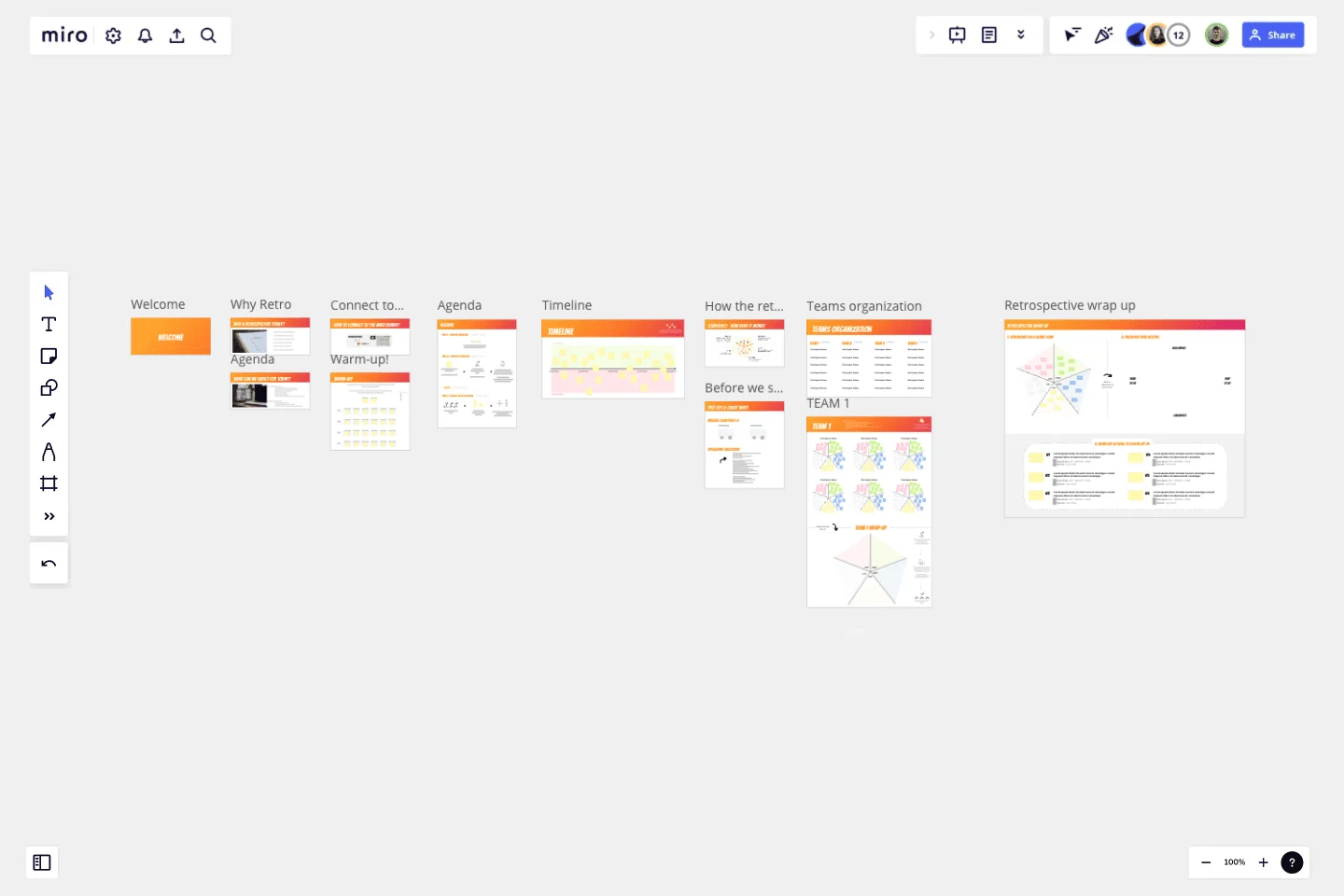Project Retrospective
This template has been designed for large teams, from 10 to 30 participants.
This template has been designed for large teams, from 10 to 30 participants. We believe that if you are more than that, a global retrospective format might not be the best way to go. If your team is smaller, this template might be too complex, but you can use it and simplify by removing parts/sections according to the number of participants.Audience size: between 10 and 30 personsWhen to use this template:
Project closing
Reaching an important milestone
End of a sprint
Teams dynamics review
Recommended duration: from 90 to 180 minutes. This template was created by FastForward.
Get started with this template right now.
What? So What? Now What? Template
Works best for:
Agile Workflows, Retrospectives, Brainstorming
The What? So What? Now What? Framework empowers you to uncover gaps in your understanding and learn from others’ perspectives. You can use the What? So What? Now What? Template to guide yourself or a group through a reflection exercise. Begin by thinking of a specific event or situation. During each phase, ask guiding questions to help participants reflect on their thoughts and experience. Working with your team, you can then utilize the template to record your ideas and to guide the experience.
Reflection Island: End of Year Team Retro
Works best for:
Retrospectives, Agile Methodology, Meetings
The Reflection Island: End of Year Team Retro template offers a creative and themed approach to retrospectives, perfect for wrapping up the year. It provides elements for reflecting on achievements, challenges, and goals using a tropical island theme. This template enables teams to celebrate successes, learn from setbacks, and set intentions for the upcoming year in a relaxed and enjoyable atmosphere. By promoting reflection and celebration, the Reflection Island: End of Year Team Retro empowers teams to strengthen bonds, boost morale, and start the new year with renewed energy and focus effectively.
Quick Retrospective by Online Department
Works best for:
Retrospectives, Agile Methodology
The Quick Retrospective template offers a concise and efficient framework for teams to reflect on recent iterations or projects. It provides elements for sharing successes, challenges, and action items in a streamlined format. This template enables teams to conduct retrospectives quickly and effectively, even with limited time. By promoting efficiency and focus, the Quick Retrospective empowers teams to drive meaningful improvements and maintain momentum in their work effectively.
Learning Loop Retro Template
Works best for:
Retros, Agile
The Learning Loop Retro template is a powerful tool designed to help teams reflect on their projects by recognizing successes and identifying areas for improvement. This template is part of Miro's Intelligent templates, which streamline workflows and keep teams engaged by integrating AI, interactive tools, and seamless integrations. One key benefit of the Learning Loop Retro template is its ability to drive continuous improvement. By regularly reflecting on their work and identifying areas for enhancement, teams can consistently elevate their performance and achieve better outcomes.
5Gs Retrospective
Works best for:
Agile Methodology, Retrospectives, Meetings
The 5Gs Retrospective template offers a structured approach for teams to reflect on their projects or iterations, focusing on five key aspects: Goals, Gains, Gratitude, Gaps, and Growth. It provides elements for identifying achievements, expressing gratitude, and addressing areas for improvement. This template enables teams to conduct retrospectives systematically, fostering a culture of learning, appreciation, and continuous improvement. By emphasizing the five dimensions of reflection, the 5Gs Retrospective empowers teams to optimize their performance, enhance collaboration, and achieve their goals effectively.
Rose, Bud, Thorn Retrospective Template
Works best for:
Agile Workflows, Retrospectives
Run a simple yet effective retrospective with the Rose, Bud, Thorn Retrospective Template. Identify positive outcomes, challenges, and opportunities moving forward.
